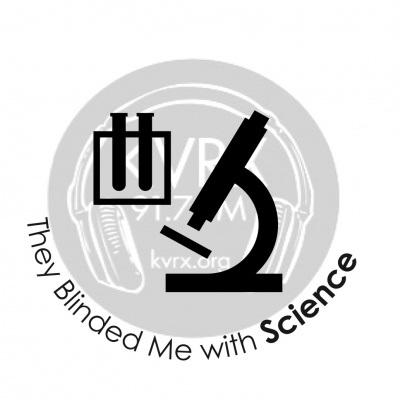Synopsis
Science interview show from KVRX student radio in Austin, Texas
Episodes
-
Monday, April 6th, 2015 - Tracy Burkhard discusses how mice communicate through song
06/04/2015 Duration: 26min‘They Blinded Me with Science’ is joined this evening by Behavioral Ecology doctorial student Tracy Burkhard. Tracy studies vocal communication in mammals, but her favorite subjects are singing mice. Tracy’s research has taken her from the laboratories of UT to the mountains of Costa Rica in search of these crooning mammals. Join us as we discuss how mice not only claim territory but also flirt with their potential mates through song, Tracy describes some of her more interesting mice hunting adventures, and the crew practices singing some of their favorite mouse songs!
-
Monday, March 23rd, 2015 - Siavash Mirarab develops computational methods to investigate large datasets in biology
23/03/2015 Duration: 26minOn this episode we're joined by University of Texas at Austin computer science PhD student, Siavash Mirarab, whose research focuses on large-scale phylogenetics. Siavash and his advisor Tandy Warnow developed a new technique for estimating evolutionary relationships ("statistical binning") that enabled an international consortium of researchers to redraw the bird family tree. He talks about this part of his PhD work which was recently published in Science magazine. Join us to learn about the computational side of biology, where complex models and methodologies are used to understand evolution from Slavish Mirarab.
-
Monday, March 2nd, 2015 - Nate Pope, Hollis Woodard, Sarah Cusser, and Kim Ballare (of the Jha Lab) discuss native bee life history and conservation
02/03/2015 Duration: 26minShalene Jha’s research group at UT-Austin conducts research on plant and pollinator landscape ecology, plant and pollinator population genetics and disease ecology, and how land use impacts critical ecological processes for native plants and their pollinators. Postdoctoral researcher Hollis Woodard and PhD students Nate Pope, Sarah Cusser, and Kim Ballare joined us to talk about native bee natural history, the evolution of sociality in bees, pollination ecology, and how agricultural development and urban landscapes affect native bee populations. Tune in to learn about how important and amazing native bees are!
-
Monday, February 23rd, 2015 - Rebecca Tarvin talks about how poison frogs avoid poisoning themselves
23/02/2015 Duration: 20minRebecca Tarvin’s doctoral research focuses on the evolution of chemical defense and resistance to self-intoxication in poison frogs (Dendrobatidae), which are native to Central and South America. Chemically defended poison frogs sequester distasteful alkaloids from insects in their diet and secrete these chemicals from dermal glands for defense. Dendrobatids are often brightly colored to warn potential predators, and the levels of toxicity vary considerably from one species to the next and from one population to another. Rebecca discusses her work on how the genetic and physiological basis of alkaloid resistance relate to phylogenetic and ecological patterns across Dendrobatidae. Tune in to learn about how poison frogs evolved the ability to resist their own toxins!
-
Monday, February 16th, 2015 - Kristina Serratto uses ultra-short, ultra-intense laser pulses to create unique states of matter
16/02/2015 Duration: 25minPhD candidate Kristina Serrato from the High Intensity Laser Science Group at UT Austin talks to us about her research on lasers, light, optics, plasma and the associated instruments used to measure these phenomena. She detailed the difference between laser plasma research and how this differs from traditional plasma research used to investigate conditions on stars. Her PhD work focuses on the interaction between lasers that have wavelengths of one micron and their interaction with single objects that are comparable in size to that wavelength. Listen to this episode to gain insight on instrumentation, logistics, and the research output associated with experimental physicist, Kristina Serrato.














